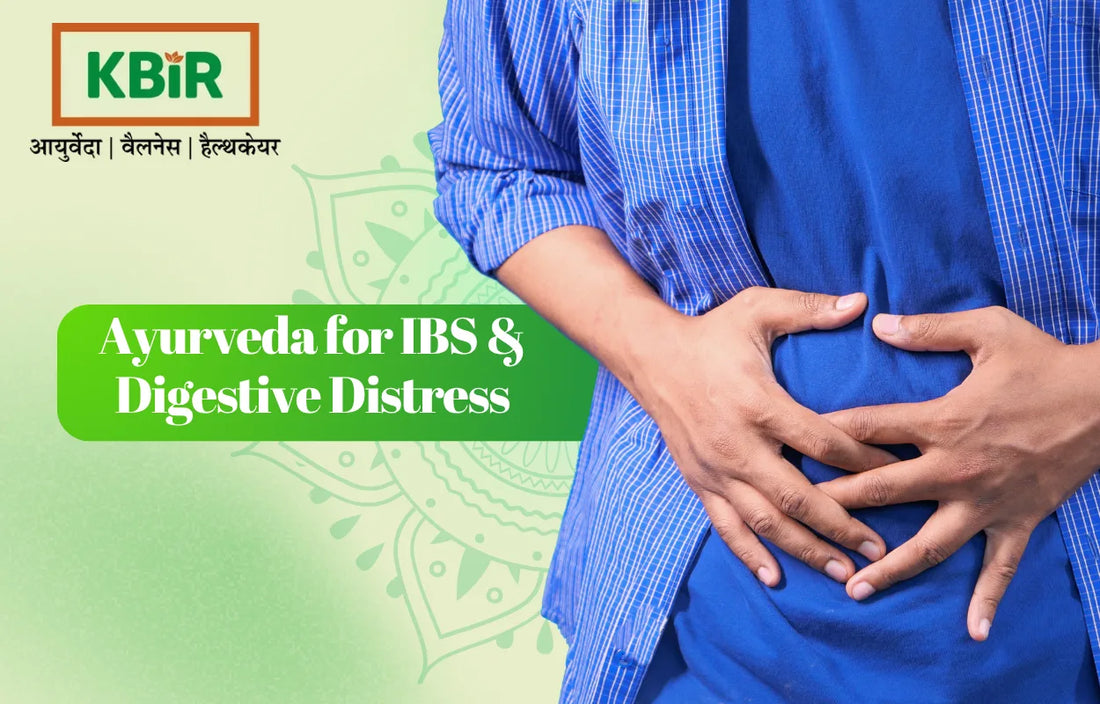






IBS and Ayurveda: Understanding the Root Cause of Digestive Distress
You have Irritable Bowel Syndrome (IBS) and you realise what living a life full of surprises is like. One day it is okay, and the next is a big, bloated, kinked, or throbbing belly. Favorite meal or going out is a cause of tension.
IBS is not uncommon with about 20% of human population suffering from the condition, and most of them unknowingly have to put up with the pain. Whereas modern medicine finds its way to pills and diets to address the symptoms, Ayurveda takes a step further. It wonders why you have become sensitive in the first place in your digestion.
This writing will prompt you to think that IBS is more than a gut problem, but it is also a mind-body imbalance. You will learn how Ayurvedic remedies for IBS and minor natural adjustments will make you feel better, not just by covering up symptoms.
Inflammatory Bowel Syndrome: The Modern Day Medical Perspective.
A. What is IBS?
IBS is a persistent intestinal illness. All these are symptoms: abdominal cramping, bloating, constipation, diarrhea, and gas. It is silent in that it does not physically hurt the gut; therefore, it is difficult to diagnose, but it certainly does interfere with your mood and comfort. Doctors are inclined to select three kinds of it:
• IBS-C (constipation dominant)
• IBS-D (diarrhea dominant)
• IBS-M (mixed type)
Therefore, the bowels look normal on scans, yet they are not functioning in an efficient manner, which leaves them with unpredictable bowel behavior.
B. Folklore Causes & Triggers:
Doctors are of the opinion that IBS is a result of a combination of an unhealthy diet, stress, and the interaction between the brain and the gut. High FODMAP food, as well as caffeine, processed or alcoholic food, will cause an attack. Stress and anxiety also contribute, which, in most situations, exacerbates the symptoms.
This gut-brain relationship works reciprocally in the way that when your mind is in a state of rapture, so is your digestive system. And even where drugs can reduce the cramps or assist in bowel motion, they do not necessarily reach the real cause. It is there that Ayurveda offers an alternative.
The Ayurvedic IBS: Grahani
A. What is Grahani?
Ayurveda IBS is like an early disease called Grahani that was described in the ancient texts such as the Charak Samhita and Susruta Samhita. The small intestine and duodenum are referred to as the grahani that digests and absorbs food. When stress causes digestive problems, poor or strange eating habits can prevent the intestines from retaining food, leading to digestive problems. This leads to gas, irregular stools, and stomach pain.
Thus, Ayurvedic medicine focuses on irritable bowel syndrome to restore proper digestion, to strengthen the intestines, and help the body maintain a balance in the natural energies.
B. The Three Doshas and Digestive Health
Ayurveda works with three doshas – Vata, Pitta, and Kapha, which govern all the activities of the human body. Disease comes when they become troubled.
1. Air & Space (Vata Dosha): This is the main dosha that causes IBS. It deals with the body's elimination and movement. Vata is disrupted by stress or by irregular food, gas, bloating, and alternating diarrhea or constipation.
2. Pitta Dosha is referred to as Fire and Water: When vitiated, it causes burning, acidity, and loose stools.
3. Kapha Dosha (Earth and water): It causes heaviness, satiety, and a fullness following light food.
C. Theory of Agni (Digestive Fire)
According to Ayurveda, Agni or digestive fire is the source of well-being. It is the one that gives food vitality.
In case Agni is dysfunctional, food cannot be digested and leaves Ama (toxins), which block the intestines and disrupt the doshas.
IBS symptoms are recurrent because of weak Agni, even when under medication, because unless digestion improves, the symptoms will not be permanent.
D. Root Causes in Ayurveda
Ayurveda acknowledges several habits, which are growing increasingly allergic to digestion:
· Eating fast, eating more, or eating foods that do not match.
· Oppressing the tendency of nature to hunger or to sleep.
· Constant anxiety, worry, and overthinking.
· Excess or deficit of sleeping or nighttime meals.
· Lack of seasonal and regular balance.
All these interfere with digestion and contribute to Vata, paving the way to IBS.
The best Ayurvedic Herbs to treat IBS
Ayurveda also presents mild, but effective, herbal treatments of IBS, which not only cure digestion, but also inflammation and stress. The most successful of them are as follows:
1. Triphala: A Mixture of three fruits that equalizes all three doshas, is a weak purgative, and purges the digestive tract. It is one of the best Ayurvedic medicines for IBS.
2. Ginger (Adrak): heats the stomach fire, reduces bloating and nausea, and soothes the gas. You may have it in tea, powder, or slices.
3. Peppermint (Pudina): This has been known to have an antispasmodic effect, relaxing the intestinal muscle and relieving pain. Enteric-coated oil capsules of peppermint tea or enteric-coated acetophenyl ampoules may be of inestimable value.
4. Fennel Seeds (Saunf): Fennel is normally eaten after meals, and it cuts gas and aids in the digestion of food easily.
5. Cumin (Jeera): Stimulates the digestive enzymes and prevents inflammation.
6. Turmeric (Haldi): Curcumin in turmeric calms inflammation and helps take care of the liver and cleanse the body.
7. Licorice Root (Yashtimadhu): Prophylactic of the bowel mucous; suppresses irritation.
8. Ashwagandha: A natural adaptogen that alleviates stress, balances Vata, and prevents IBS caused by stress.
Ayurvedic Formulations for IBS
Ayurvedic treatment can be made easier to adhere to by combining some modern herbs with tradition. One such product is KBIR Wellness IBS Cure Tablet, an herbal medicine that is composed of Harad, Jeera, Pudina, Anardana, and other herbs. It is reported to improve digestion, alleviate bloating, and bowel movement as well.
The other product is IBS Cure Powder, which helps detoxify and increase digestive fires. The two are both natural remedies for the irritable bowel, and they are also in line with Ayurveda. However, it is always prudent to consult the Ayurvedic practitioner first before adding any formulation into your use so as to ensure that the formulation will not be incompatible with your dosha and type of digestion.
Mind and Body Connection: Stress Management
A. IBS and Stress: The Relationship
Digestion and stress are two processes that accompany each other. Research has shown that patients with IBS have triple the chances of developing anxiety or depression. According to Ayurveda, it is explained by the gut-brain axis | emotions directly influence digestion.
Stress increases Vata dosha, which develops inconsistent bowel patterns and stomach sensitivity. The reduction of stress is, therefore, not an addition to IBS care.
B. Ayurvedic Management of Stress
Ayurveda recommends non-stimulating methods to cool the body and the mind in the long run.
· Meditation:10 minutes a day relaxes the nervous system.
· Mindful eating: Slow down, take your seat, chew.
· Aromatherapy: Lavender and chamomile essential oils are a calming influence on the nervous system and alleviate anxiety.
· Sleep: Restoring digestive balance with at least 7-8 hours of sleep per night.
· Preventing the stressful circumstances- and not pushing emotional boundaries averts the flare-ups.
· Nature connection: A walk in nature or a silent journey in nature is a natural way of relaxing the mind.
Such easy practices not only calm the mind, but also rest the digestive system, and prevent the IBS and stress cycle.
Conclusion
IBS is not merely a stomach problem; it is the sign the body is giving of imbalance. Although modern medicine can alleviate symptoms nowadays, Ayurveda goes to the bottom of the issue of how and why the imbalance began and how to restore it internally and externally.
Digestive stability would be gradually restored by feeding Agni, balancing doshas, and calming the mind. IBS Cure Tablet pills, Triphala, Ginger, and Fennel herbs and pills can assist in curing with care in eating, better sleeping, and emotional well-being.
After all, there is no one product that is the most appropriate ayurvedic remedy to use when it comes to IBS, but it is a lifestyle of being conscious, balanced, and careful of oneself. When you do good to your gut and have empathy, your entire body begins to recover.

